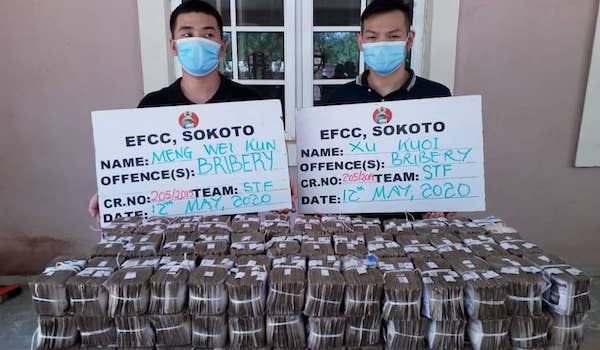Metro
Sokoto High Court grants bail to 2 Chinese nationals accused of bribing EFCC officials with N100m

Two Chinese citizens accused of bribing an official of the Economic and Financial Crimes Commission (EFCC) have both been granted bail by a High Court sitting in Sokoto State.
The suspects who were arrested on Monday, May 11 after paying N100 million bribe to an EFCC officer were granted bail on Thursday by the Chief Judge of Sokoto State, Justice Muhammad Saidu Sifawa.
While delivering judgement, Justice Sifawa who granted the accused person bail said that the respondents have not been able to dislodge the presumption of innocence of the accused.
Justice Sifawa ordered the accused to submit a sum of N5million each and two surety in like sum, one of which must be resident in Sokoto and have a landed property that has a certificate of occupancy.
READ ALSO: OAU secures NUC’s full accreditation for Law, Dentistry, others
The presiding judge also ordered the accused persons to submit their international passport with the Chief Registrar of the court while demanding them to undertake that they would not travel out of the country throughout the duration of the trial.
The pair, Mr Meng Wei Kun and Mr Xu Koi, were arrested by the Sokoto zonal office of the commission, whose head, Mr Abdullahi Lawal, was offered the N50 million bribe with a promise to balance him another N50 million.
A statement by Dele Oyewale, Head, Media and Publicity of the EFCC, on Tuesday said the suspects were arrested on Monday, May 11, 2020 in Sokoto.
Join the conversation
Support Ripples Nigeria, hold up solutions journalism
Balanced, fearless journalism driven by data comes at huge financial costs.
As a media platform, we hold leadership accountable and will not trade the right to press freedom and free speech for a piece of cake.
If you like what we do, and are ready to uphold solutions journalism, kindly donate to the Ripples Nigeria cause.
Your support would help to ensure that citizens and institutions continue to have free access to credible and reliable information for societal development.
























